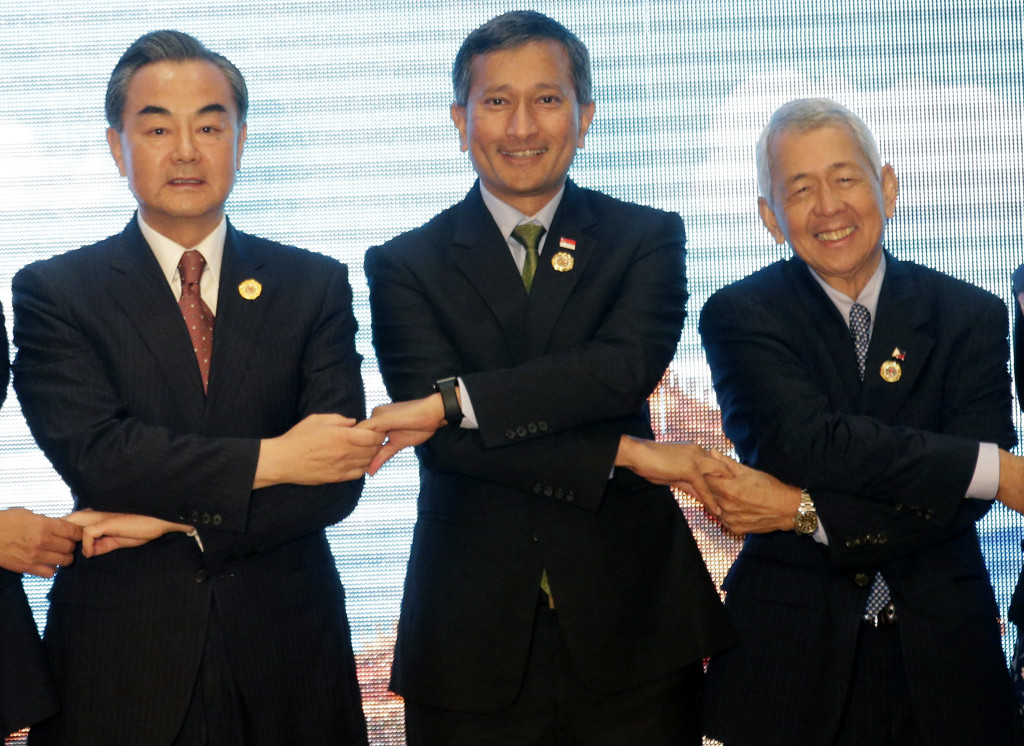
Chinese Foreign Minister Wang Yi, left, Singapore’s Foreign Minister Vivian Balakrishnan, center, and Philippine Foreign Secretary Perfecto Yasay Jr., pose for a photo during the Association of Southeast Asian Nations (ASEAN) – China Foreign Ministers’ Meeting in Vientiane, Laos, Monday, July 25, 2016. AP
VIENTIANE, Laos — Asean foreign ministers on Monday reaffirmed the freedom of navigation in the South China Sea and the importance of non-militarization and self-restraint in the conduct of all activities, but made no mention of a recent ruling by an arbitration tribunal on the disputed waters.
READ: ASEAN split on how to deal with China in South China Sea row
“We…took note of the concerns expressed by some Ministers on the land reclamations and escalation of activities in the area, which have eroded trust and confidence, increased tensions and may undermine peace, security and stability in the region,’’ the foreign ministers said in a joint communique issued after their discussions in Vientiane.
“We reaffirmed the importance of maintaining and promoting peace, security, stability, safety and freedom of navigation in and over – flight above the South China Sea. We further reaffirmed the need to enhance mutual trust and confidence, exercise self-restraint in the conduct of activities and avoid actions that may further complicate the situation, and pursue peaceful resolution of disputes in accordance with international law, including the 1982 United Nations Convention on the Law of the Sea (UNCLOS),” the ministers said.
They also stressed “the importance of non-militarization and self-restraint in the conduct of all activities, including land reclamation that could further complicate the situation and escalate tensions in the South China Sea.”
The statement, however, did not mention the ruling on July 12 by an arbitration tribunal that rejected China’s vast claims in the South China Sea in a case filed by the Philippines at the Permanent Court of Arbitration (PCA) at The Hague.
READ: Philippines wins arbitration case vs. China over South China Sea
China–which claims almost all of the South China Sea–has rejected the ruling and pressured its allies in Asean to prevent the bloc from taking a common position on the issue.
READ: South China Sea: China willing to pay the price of defiance
Speaking in Laos after meeting Asean foreign ministers, Chinese foreign minister Wang Yi said that the South China Sea issue should not define Asean-China relations. He added that China also plans to fast-track consultations on a Code of Conduct in the South China Sea.
Singapore’s Foreign Minister Vivian Balakrishnan said in a Facebook post: “Delighted that ASEAN demonstrated unity of purpose by issuing a principled joint communique that was all the more crucial given recent developments in our region. Asean unity is essential for Asean centrality in shaping our regional strategic architecture.”
“The most challenging part of the negotiations was the formulation of the 2nd paragraph. It is an important statement of principle that is worth emphasizing. It goes to the heart of the challenge for small states like us,” he wrote.